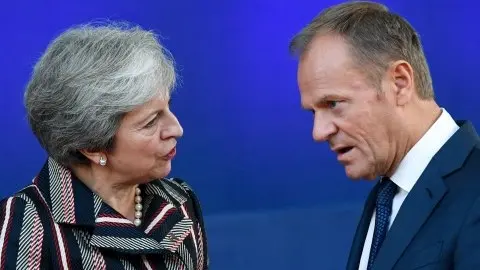Cautious Bank of England could still opt to raise rates in 2019
While the Bank of England is clear it'll stay firmly on the sidelines amid the current uncertainty, there are still hints that it could be inclined to hike rates earlier than markets think. As ever, it all depends on Brexit
It all depends on Brexit...
The March Bank of England meeting is probably one of those that policymakers would have ideally liked to skip. The Brexit backdrop makes it very hard for the Bank to say much about the economic outlook, and as might you might expect, the statement contains various references to the ongoing uncertainty.
Unsurprisingly, the Bank has also kept its cards close to its chest when it comes to the prospect of rate rises, simply saying that further tightening may be required.
Importantly though, we think it’s too early to completely rule out a rate hike this year - although of course, this depends almost solely on Brexit. Here are few possible scenarios:
Deal approved and the UK enters a transition period
There are reports that prime minister Theresa May will attempt to bring her deal back to parliament next week for a third meaningful vote. This relies on her finding a satisfactory way to duck Speaker John Bercow’s requirement for a “substantial change”, and even then, the odds still appear stacked against the prime minister's deal.
But if PM May does find a way of getting a deal through, then talk of a near-term rate hike could quickly return. Wage growth is running at a post-crisis high and given that this stems from skill shortages in various parts of the economy, we don’t expect this trend to reverse rapidly. The Bank’s forecast of excess demand at the tail-end of its forecast period implies that more tightening could be needed than currently priced into markets.
You could reasonably argue that with the Federal Reserve and the ECB seemingly on pause for the foreseeable future, it’s hard to see the Bank of England going against the grain. But barring a more severe global downturn in growth, we suspect policymakers will be more inclined to play ‘catch up’. For this reason, we’ve loosely pencilled in a rate hike for November.
Article 50 extended
For the Bank of England outlook, a lot depends on how long the Article 50 negotiating period is extended. A short extension until the end of May would keep the risk of ‘no deal’ firmly alive, and this would continue to keep a lid on economic growth. While further extensions might be possible, the risk of the EU saying ‘no’ could increase.
Unless PM May manages to get her deal approved over the course of next week (or before the 12 April deadline to trigger European elections), it seems like the EU might be more minded to offer Britain a long extension to the Article 50 period. In theory, a delay to the end of the year or beyond could open a narrow window for the Bank of England to hike over the summer – on the basis that it could help unlock some consumer spending and give businesses temporary reprieve.
This relies on the economy rebounding fairly quickly though, and it’s equally possible that a long extension leads to a prolonged pause at the Bank. After all, having come this close to the cliff-edge, businesses will be alive to the possibility that it could happen again and investment will stay under pressure.
No deal - Brexit
We suspect parliament will do all it can to prevent a 'no deal' Brexit on 29 March, and we still suspect the EU will be reluctant to block an Article 50 extension too if it leads to the UK crashing out of the European Union.
But if we're wrong, then the Bank of England has suggested rates could go in either direction. On balance though, we suspect 'no deal' would cause a substantial hit to confidence (in addition to significant disruption to supply chains), which makes it much more likely the Bank would decide to cut interest rates in this scenario.
This publication has been prepared by ING solely for information purposes irrespective of a particular user's means, financial situation or investment objectives. The information does not constitute investment recommendation, and nor is it investment, legal or tax advice or an offer or solicitation to purchase or sell any financial instrument. Read more
Download
Download snap
21 March 2019
In case you missed it: Central banks take a U-turn This bundle contains 9 Articles